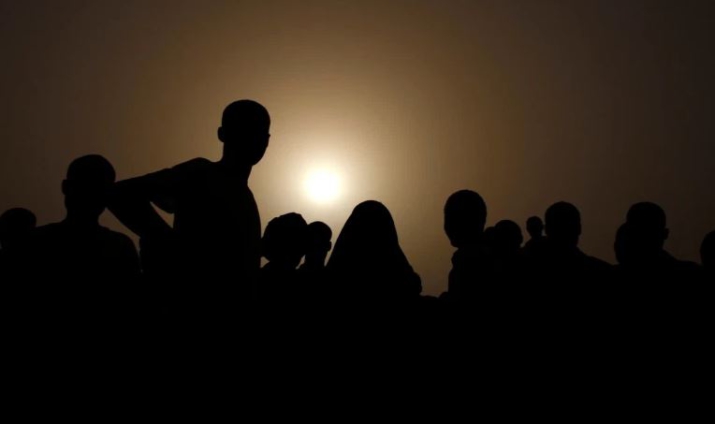From a filthy cell in Saudi Arabia, the Ethiopian migrant spoke on a smuggled phone, fearing to give his name.
Some 300 countrymen are imprisoned with him, he said. And no one knows when Ethiopia’s government might bring them home.
“We are detained in a very inhumane condition, sleeping on waste overflowing from a nearby toilet. We really want to go back home but no one is assisting us, including Ethiopian officials,” he told The Associated Press from a detention centre outside the Saudi capital, Riyadh.
“We are beaten every day and our only crime was seeking a better life in a foreign land.”
New details are emerging of the squalid detention conditions facing thousands of migrants from Ethiopia – men, women and children – some who were chased across the border from Yemen into Saudi Arabia this year amid gunfire because of coronavirus fears.
A new report released on Friday by Amnesty International describes widespread abuses, including beatings and electrocutions, in Saudi detention facilities. Detainees described being chained together in pairs and being forced to use cell floors as toilets.
“Surrounded by death and disease, the situation is so dire that at least two people have attempted to take their own lives,” Amnesty researcher Marie Forestier says in the report.
“Pregnant women, babies and small children are held in these same appalling conditions, and three detainees said they knew of children who had died.”

The abuses highlight one of the most popular, and most dangerous, migrant routes in the world. The Saudi government did not immediately comment.
Thousands of Ethiopians cross into Saudi Arabia every year after a journey across the Red Sea or Gulf of Aden from Somalia or Djibouti and through conflict-torn Yemen, looking for better lives.
Amnesty International said thousands of Ethiopian migrants had been working in northern Yemen, earning money to pay for their passage to Saudi Arabia.
“When the covid-19 pandemic escalated, Houthi authorities began ordering migrant workers to go to the border, where they reportedly became caught in crossfire between Saudi and Houthi forces,” the new report says.
Life-threatening conditions
The International Organization for Migration says some 2,000 Ethiopians are stranded on the Yemeni side of the border without food, water or healthcare.
Now migrants say they are held in life-threatening conditions.
“I wouldn’t have left my country had I known this hellish condition would await me,” another detained migrant told the AP. “I had some suicidal thoughts in the past.
It is just unbearable, especially during those very hot days, since we don’t have an air conditioner. And they beat us with electric cords whenever we complain. And they took all our money and cell phones.”
He said he was detained nine months ago because his Saudi residence card had expired. “The only thing I want now is to return to Ethiopia, but that’s just a dream for now,” he said. The detainees spoke on condition of anonymity out of fear for their safety.
The covid-19 pandemic has complicated their repatriation, with Ethiopian authorities saying they do not have the quarantine capacity to handle the return of so many people at once.
Ethiopia’s state minister at the foreign ministry, Tsion Teklu, told the AP that up to 16,000 Ethiopians are estimated to be held in Saudi prisons. She said some 4,000 have been repatriated since April.
“We are now working to repatriate 2,000 more migrants by bringing around 300 of them every week,” she said, adding that Ethiopia has repatriated some 400,000 in recent years. “The problem is compounded with the fact that some of our citizens that are repatriated are retrafficked.”
“If quarantine spaces remain a significant obstacle, other governments and donors must support Ethiopia to increase the number of spaces to ensure migrants can leave these hellish conditions as soon as possible,” Forestier said. “Nothing, not even a pandemic, can justify the continued arbitrary detention and abuse of thousands of people.”
Latest Stories
-
Supreme Court dismisses petition against constitutionality of anti-gay bill
3 minutes -
Checkmate: Unpacking the role of ‘Pawn’ in Ghana’s cinema
10 minutes -
CHAN 2024: ‘There is a bright chance of qualification’ – Didi Dramani on Nigeria clash
12 minutes -
CHAN 2024Q: Black Galaxies coach Didi Dramani ‘refining’ players ahead of Nigeria clash
16 minutes -
GPL 2024/25: Evans Adotey takes interim charge of Medeama until end of the season
30 minutes -
Nebojsa Kapor leaves Medeama following contract expiration
31 minutes -
I was told politics is not for ‘Cantata’ people – Actress Ebi Bright
47 minutes -
Armah Kofi-Buah urges unity in Ellembelle after massive NDC victory
50 minutes -
Fameye’s London show: DJ Chos’ management breaks silence
1 hour -
Supreme Court set to rule on anti-LGBTQI case today
1 hour -
Ghana ‘may square up’ with USA, UK for Olympic medals with focus on boxing – Nii Lante Vanderpuye
1 hour -
We won’t be a disruptive opposition – Miracles Aboagye
1 hour -
Kwame Opoku ‘ready’ for pressure after Kotoko return
2 hours -
Dumelo provides free bus ride for Legon students to travel for Christmas holidays
3 hours -
Mahama forms 5-member team to collect public reports on suspected corruption cases
3 hours

